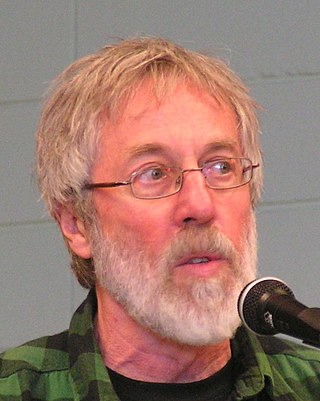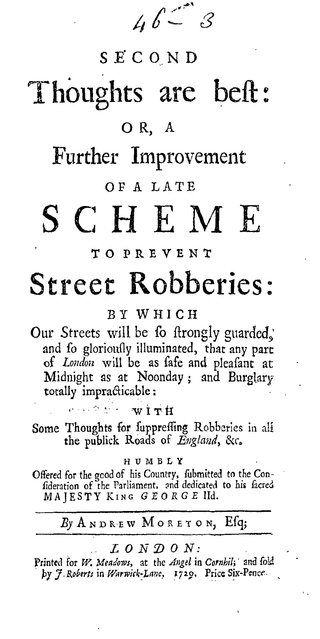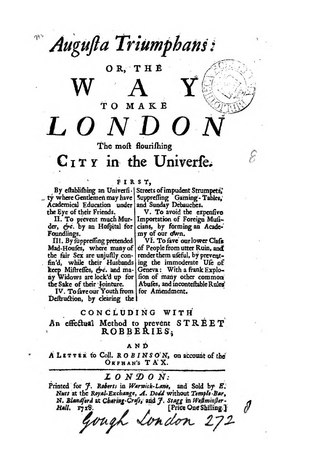
Daniel Defoe was an English journalist, merchant, pamphleteer and spy. He is most famous for his novel Robinson Crusoe, published in 1719, which is claimed to be second only to the Bible in its number of translations. He has been seen as one of the earliest proponents of the English novel, and helped to popularise the form in Britain with others such as Aphra Behn and Samuel Richardson. Defoe wrote many political tracts, was often in trouble with the authorities, and spent a period in prison. Intellectuals and political leaders paid attention to his fresh ideas and sometimes consulted him.

Victor of Aveyron was a French feral child who was found around the age of 9. Not only is he considered one of the most famous feral children, but his case is also the most documented case of a feral child. Upon his discovery, he was captured multiple times, running away from civilization approximately eight times. Eventually, his case was taken up by a young physician, Jean Marc Gaspard Itard, who worked with the boy for five years and gave him his name, Victor. Itard was interested in determining what Victor could learn. He devised procedures to teach the boy words and recorded his progress. Based on his work with Victor, Itard broke new ground in the education of the developmentally delayed.

Robinson Crusoe is an English adventure novel by Daniel Defoe, first published on 25 April 1719. Written with a combination of Epistolary, confessional, and didactic forms, the book follows the title character after he is cast away and spends 28 years on a remote tropical desert island near the coasts of Venezuela and Trinidad, encountering cannibals, captives, and mutineers before being rescued. The story has been thought to be based on the life of Alexander Selkirk, a Scottish castaway who lived for four years on a Pacific island called "Más a Tierra" which was renamed Robinson Crusoe Island in 1966. Pedro Serrano is another real-life castaway whose story might have inspired the novel.

John Edward Zerzan is an American anarchist and primitivist author. His works criticize agricultural civilization as inherently oppressive, and advocates drawing upon the ways of life of hunter-gatherers as an inspiration for what a free society should look like. Subjects of his criticism include domestication and symbolic thought.

Conyers Middleton was an English clergyman. Though mired in controversy and disputes, he was also considered one of the best stylists in English of his time.

A feral animal or plant is one that lives in the wild but is descended from domesticated individuals. As with an introduced species, the introduction of feral animals or plants to non-native regions may disrupt ecosystems and has, in some cases, contributed to extinction of indigenous species. The removal of feral species is a major focus of island restoration.

Mary Toft, also spelled Tofts, was an English woman from Godalming, Surrey, who in 1726 became the subject of considerable controversy when she tricked doctors into believing that she had given birth to rabbits.

John "Jack" Sheppard, or "Honest Jack", was a notorious English thief and prison escapee of early 18th-century London.

Jonathan Wild, also spelled Wilde, was a London underworld figure notable for operating on both sides of the law, posing as a public-spirited vigilante entitled the "Thief-Taker General". He simultaneously ran a significant criminal empire, and used his crimefighting role to remove rivals and launder the proceeds of his own crimes.

Peter the Wild Boy was a boy from Hanover in northern Germany who was found in 1725 living wild in the woods near Hamelin, the town of the Pied Piper legend. The boy, of unknown parentage, had been living an entirely feral existence for an unknown length of time, surviving by eating forest flora; he walked on all fours, exhibited uncivilized behaviour and could not be taught to speak a language. He is now believed to have suffered from the very rare genetic disorder Pitt–Hopkins syndrome.
In archaic terminology, a footpad is a robber or thief specialising in pedestrian victims. The term was used widely from the 16th century until the 19th century, but gradually fell out of common use. A footpad was considered a low criminal, as opposed to the mounted highwayman who in certain cases might gain fame as well as notoriety. Footpads operated during the Elizabethan era and until the beginning of the 19th century.

A feral child is a young individual who has lived isolated from human contact from a very young age, with little or no experience of human care, social behavior, or language. The term is used to refer to children who have suffered severe abuse or trauma before being abandoned or running away. They are sometimes the subjects of folklore and legends, often portrayed as having been raised by animals. While there are many cases of children being found in proximity to wild animals, there are no eyewitness accounts of animals feeding human children.

Thomas Bradbury (1677–1759) was an English Dissenting minister.
In Plato's theory of epistemology, anamnesis refers to the recollection of innate knowledge acquired before birth. The concept posits the claim that learning involves the act of rediscovering knowledge from within oneself. This stands in contrast to the opposing doctrine known as empiricism, which posits that all knowledge is derived from experience and sensory perception. Plato develops the theory of anamnesis in his Socratic dialogues: Meno, Phaedo, and Phaedrus.

Duncan Campbell (1680?-1730) was a Scottish deaf man and professed soothsayer.
George Ridpath was a Scottish journalist, who wrote in the Whig interest.

Second Thoughts Are Best: or, a Further Improvement of a Late Scheme to Prevent Street Robberies is a 1729 pamphlet by Daniel Defoe. He wrote it under the name of Andrew Moreton Esq., presented as a dissatisfied middle-class old man who was extremely concerned about the increase in criminality around the 1720s.

Augusta Triumphans: or, the Way to Make London the Most Flourishing City in the Universe by Daniel Defoe was first published on 16 March 1728. The fictitious speaker of this pamphlet, Andrew Moreton, is a man in his sixties who offers suggestions for the improvement of London. In particular, he fosters the establishment of a university, an academy of music, a hospital for foundlings and licensed institutions for the treatment of mental diseases. Moreover, he encourages the introduction of measures to prevent moral corruption and street robbery.
Andrew Moreton is a pseudonym used by Daniel Defoe in several pamphlets published between 1725 and 1729, proposing some new reflections on themes already discussed in Defoe's 1697 An essay upon projects. Moreton is presented as a crotchety middle-class old gentleman complaining about the indecency of London social life in the latest years. Fulfilling his duty as an honest and concerned citizen, Moreton firmly advances possible reforms in order to improve the quality of life of all social classes.
An Essay Upon Projects (1697) was the first volume published by Daniel Defoe. It begins with a portrait of his time as a "Projecting Age" and subsequently illustrates plans for the economic and social improvement of England, including an early proposal for a national insurance scheme.
















